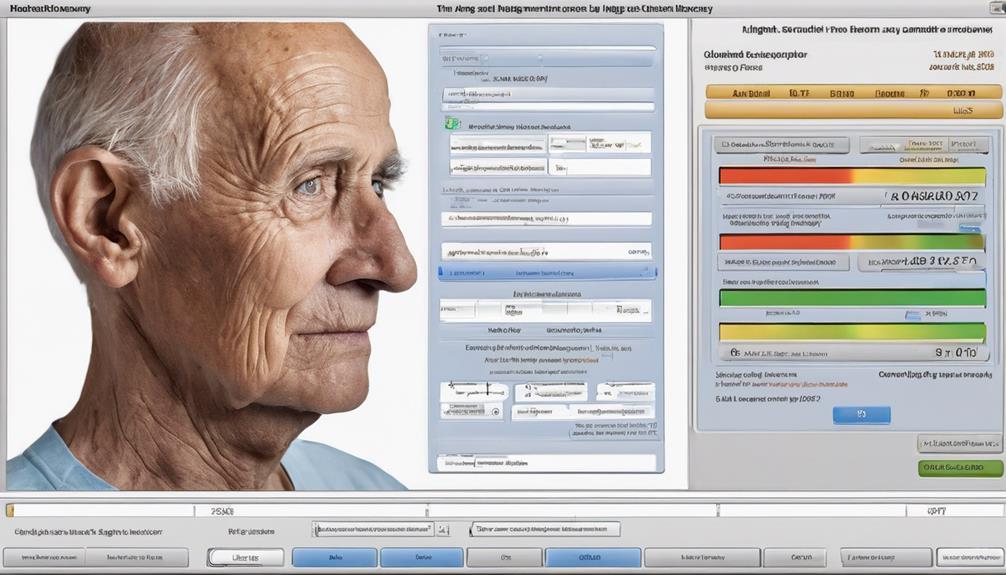While dealing with the complex process of caring for individuals with Lewy body dementia, imagine having a tool that provides guidance for what lies ahead.
This calculator, armed with a wealth of data and variables, provides a glimpse into the future for those impacted by LBD.
The ability to forecast potential outcomes can be both enlightening and daunting, prompting us to consider the significance of preparation and support systems in place.
Join us as we explore the realm of possibilities this innovative tool unveils and the implications it holds for caregivers and those touched by Lewy body dementia.
Key Takeaways
- Tailored care plans crucial due to coexisting health conditions.
- Advanced stages lead to increased frailty and compromised immunity.
- Shared decision-making enhanced by analyzing key risk factors.
- Personalized prognosis aids in informed choices for treatment and end-of-life care.
Factors Affecting Life Expectancy
Understanding the key factors that influence life expectancy in individuals with dementia with Lewy bodies is essential for providing targeted care and making informed end-of-life decisions. Coexisting health conditions play a significant role in determining the lifespan of those with Lewy body dementia. The presence of other life-limiting illnesses can impact overall survival and prognosis in these patients, potentially affecting their predicted lifespan.
Moreover, deaths from unrelated causes can occur at any stage of the disease, further complicating life expectancy calculations. Advanced stages of Lewy body dementia often result in increased frailty, mobility issues, and a compromised immune system, all of which can influence survival rates. Recognizing and understanding these factors affecting life expectancy in individuals with dementia with Lewy bodies is crucial for tailoring care plans and making appropriate end-of-life arrangements.
Using the Calculator

The Lewy Body Dementia life expectancy calculator efficiently analyzes key risk factors to predict survival probabilities for individuals diagnosed with the condition. Using this tool can provide valuable insights into the potential trajectory of the disease. Here are some essential points to consider when utilizing the calculator:
- Personalized Prognosis: The calculator takes into account factors such as age, sex, cognitive function, comorbidities, and living situation to offer personalized prognosis information.
- Shared Decision-making: It aids in shared decision-making and care planning by providing data-driven insights that can guide discussions between healthcare professionals, patients, and caregivers.
- Understanding Disease Progression: Healthcare professionals can use the calculator to help patients and caregivers understand the potential progression of Lewy Body Dementia, enabling them to plan and provide appropriate care.
- Statistical Analysis: The accuracy and reliability of the calculator's predictions are supported by statistical analysis and calibration methods, ensuring that the information provided is trustworthy and valuable in the context of dementia care.
Interpreting Results
To interpret the results generated by the Lewy Body Dementia life expectancy calculator, consider the 3-year survival probabilities based on key risk factors such as age, sex, cognitive function, comorbidity burden, and living situation. These factors play a crucial role in determining life expectancy for individuals with Lewy body dementia.
Understanding the implications of the survival probabilities can aid in shared decision-making between healthcare providers, patients, and caregivers. By incorporating these results into care planning, healthcare professionals can offer tailored support and interventions to improve the quality of life for patients with Lewy body dementia.
Shared decision-making, based on personalized prognosis, enables informed choices regarding treatment options and end-of-life care. By comprehensively assessing the factors influencing life expectancy, healthcare providers can develop effective care plans that address the specific needs of each individual with Lewy body dementia, ultimately enhancing their overall well-being.
Care Planning Strategies

How can personalized prognosis based on key risk factors enhance care planning strategies for individuals with Lewy body dementia?
Care planning strategies for Lewy body dementia benefit greatly from personalized prognosis, especially when considering end-of-life discussions. Here are some key points to consider:
- Utilize predictive models: These models can accurately estimate survival probabilities over a 3-year period, aiding in shared decision-making.
- Consider comorbidity burden: Factors like comorbidities, dementia subtype, and medication use significantly impact life expectancy.
- Tailor care plans: Healthcare professionals can use risk tables based on easily obtainable variables to develop personalized care plans for patients.
- End-of-life care: When planning care for individuals with Lewy body dementia, factors like impaired daily functioning, specific dementia subtypes, and the availability of caregivers should be taken into account for optimal support.
Real-Life Examples
Exploring real-life cases of individuals diagnosed with Lewy body dementia provides valuable insights into the varied survival outcomes and challenges associated with this condition. People with dementia experience a wide range of survival times post-diagnosis, typically ranging from 5 to 7 years on average, with some individuals living up to 20 years.
Men generally exhibit higher mortality rates compared to women following a Lewy body dementia diagnosis. The disease progresses through seven stages, with stage seven lasting approximately 1.5 to 2.5 years before death occurs in individuals with Lewy body dementia.
Common causes of death among these patients include pneumonia and infections due to the progressive nature of the disease. Caregiver support and maintaining quality of life are essential components in managing Lewy body dementia, particularly as the condition advances.
Understanding these real-life examples is crucial for comprehending the challenges faced by individuals with Lewy body dementia towards the end of life and the necessary care they require.
Frequently Asked Questions
What Is the Average Lifespan of Someone With Lewy Body Dementia?
We estimate the average lifespan of someone with Lewy Body Dementia to be around 5 to 7 years post-diagnosis. Men generally have higher mortality rates than women with this condition.
Common causes of death include pneumonia and infections. The disease progresses through seven stages, with stage seven typically lasting 1.5 to 2.5 years before death.
Although some individuals may live up to 20 years post-diagnosis, this is less common.
What Are the Signs of End Stage Lewy Body Dementia?
In end-stage Lewy body dementia, signs include severe cognitive decline and communication limitations to single words or phrases. There is reliance on assistance for daily activities like eating and dressing. Challenges with swallowing and nutrition intake issues can arise, along with an increased risk of aspiration pneumonia. Bowel and bladder incontinence may require specialized care. Progressive mobility loss leading to being bed-bound necessitates proper positioning and pressure sore prevention.
Can Lewy Body Dementia Get Worse Suddenly?
Yes, Lewy Body Dementia can indeed worsen suddenly, with fluctuations in cognition leading to rapid changes in alertness, attention, and the emergence of hallucinations, delusions, and severe behavioral changes.
Motor symptoms like tremors, stiffness, balance issues, and abrupt declines in cognitive function may also worsen suddenly, impacting mobility and coordination.
It's crucial for caregivers to monitor for abrupt changes in symptoms and promptly seek medical advice to address any sudden deterioration in Lewy Body Dementia.
Can Someone With Lewy Body Dementia Be Left Alone?
We shouldn't leave someone with Lewy body dementia alone due to safety risks and unpredictable behaviors. Fluctuating cognition and hallucinations can lead to accidents, wandering, and vulnerability to exploitation or neglect. It's crucial to have constant supervision to ensure well-being.
Caregivers must provide support and assistance at all times to prevent dangerous situations. Leaving a person with LBD unsupervised can have serious consequences, so vigilance is essential.
Conclusion
In using the Lewy Body Dementia Life Expectancy Calculator, we've gained valuable insights into the factors affecting survival probabilities. By considering age, sex, cognitive function, comorbidities, and medication use, we can better understand the progressive nature of LBD.
This tool serves as a vital resource for care planning and decision-making, providing personalized prognosis and enhancing awareness of the impact of LBD on individuals' lives.









